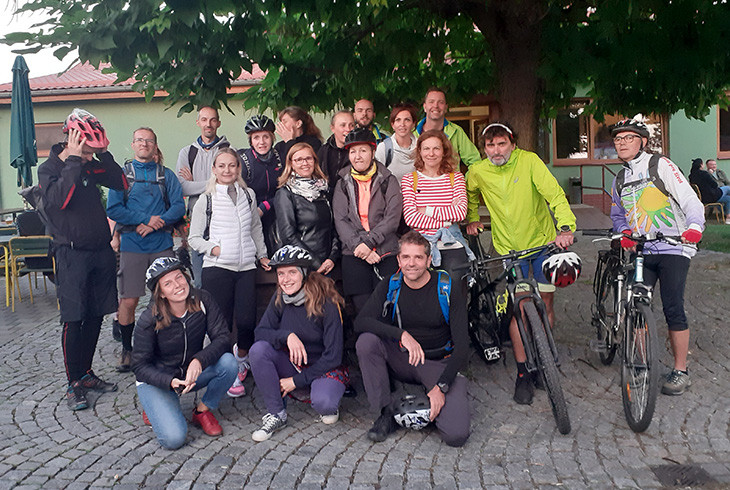

New
Sustainable mobility and energy: Experiences from North Moravia
15. 11. 2023
![]() Air
Air
It is better to see once than to hear a hundred times. The participants of the study trip to North Moravia in mid-October could convince themselves of the validity of the saying. During four days, mayors and officials could be inspired by innovative projects and solutions in the field of community energy, proper heating, air quality and the development of sustainable mobility.

Community energy in North Moravia
Trojanovice is a municipality that has a lot of experience with the successful implementation of environmentally and economically sustainable projects. Their CÉRKA project aims to transform a zone inaccessible to the public into an open, lively place that will become a good address for work, living and leisure. The unique location near the Beskydy PLA predetermines the nature of the place, where nature and environmental protection should play an important role. Innovative in this case is the "Smart Village" approach.
Smart Villages are communities in rural areas that use innovative solutions to improve their resilience, building on local strengths and opportunities. In the case of the CERKA project, they are planning e.g. intelligent parking, the use of autonomous vehicles, the use of "smart" technologies in the energy sector of buildings or public lighting. Martin Krupa, former mayor of Mikolajice, presented examples of his work in the field of community energy to the participants of the business trip. By reconstructing several public buildings in a small village, connecting them to a photovoltaic power plant and a cogeneration unit with a biomass boiler, they created an energy-independent system - the first in the Czech Republic.
Making air information available, education and measures at the level of urban planning
On the second day, the participants of the work trip had the opportunity to visit several organizations that are dedicated to air quality in Ostrava. Colleagues from the Energy Research Center at the Technical University of Ostrava presented the latest technological innovations in the field of home heating and the impact of different types of fuel on the environment.
During the visit to the Czech Hydrometeorological Institute, we had the opportunity to learn about the problems with air quality in Ostrava and the measures taken to solve them. Their cooperation with the State Health Institute on monitoring the impact of polluted air on residents is also interesting, and especially their work with the information they provide to the public in an accessible form. We ended the day with a visit to Little Copenhagen with the MAPPA studio, which is dedicated to spatial planning and the development of sustainable mobility within the statutory city of Ostrava.
By train and by bicycle to Uničov and Šternberk
The third day was dedicated to cycling and sustainable mobility. The participants were divided into two groups - one traveled by bicycle, the other by public transport to the city of Uničov. A group of cyclists tried out the cycle routes around Olomouc. An interesting service is provided by Czech Railways, where citizens can rent bicycles for short-term trips and combine them with train transport.
In Uničov, both groups met and representatives of the municipality presented an approach to building bicycle transport in a city where the use of bicycles has a long tradition. Part of the participants again traveled to the city of Šternberk on bicycles, and another by "express train". So we could compare the quality of cycle paths and rail transport. In conclusion, we heard from the representatives of local governments in the region about the unique cooperation between railways and municipalities, where České dráhy provides land for the construction of cycling infrastructure free of charge.
Olomouc – a city where traffic calming improves all aspects of public life
On the last day, a workshop was held in Olomouc with representatives of the local government, who presented measures to improve air quality and plans for the future. The parking policy of the city, the support of bicycle transport and the construction of cycle paths were discussed.
We could see well-functioning projects or visions of municipalities that have been dedicated to improving the conditions for the development of sustainable mobility and sustainable energy for more than 20 years. We believe that participants returned home with inspiration and information that they can apply in their communities.











